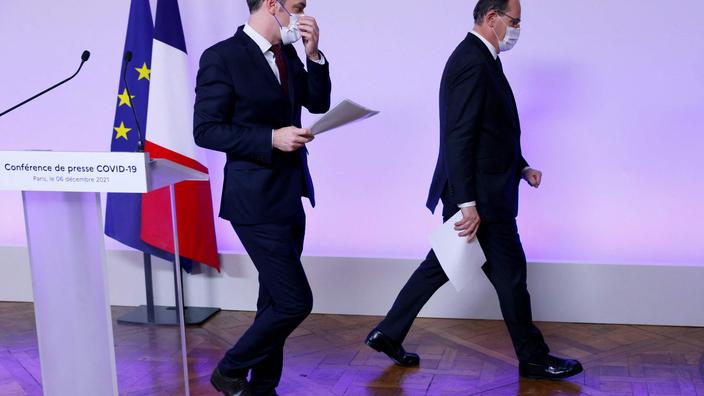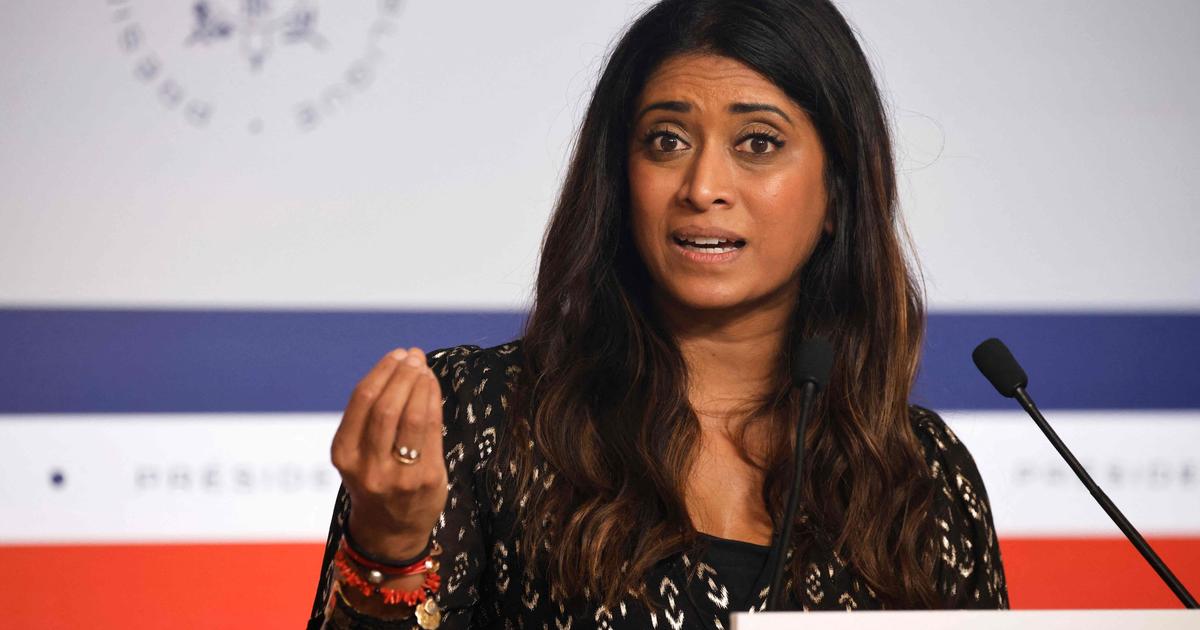Gérald Kierzek is an emergency physician and health columnist, medical director of Doctissimo, and author in particular of
Coronavirus, how to protect yourself?
(Éditions de l'Archipel, March 2020).
FIGAROVOX. - The government yesterday announced new measures to fight against the fifth wave, including the closure of nightclubs and the wearing of masks outside at school. Are these restrictions a step in the right direction?
Gerald KIERZEK. -
These restrictions are more of the order of political display than of health efficiency.
The government wants and must stand and must announce measures to show that it is doing something.
We are in the "at the same time" of the President of the Republic: he wants to hold out until Christmas because he understood that the epidemic of positive cases without hospital repercussions will follow the evolution of any viral epidemic, particularly in winter. , with an increase in cases then a spontaneous descent; we are talking about the natural history of the virus with successive “waves”. And at the same time, we must calm an alarmist medical current and a certain fringe of the terrorized population, with announcement effects, so as not to be reproached for doing nothing! Wearing a mask outdoors does not make sense because the virus is transmitted in closed places and nightclubs are sacrificed even though they had respected barrier protocols and gestures.
The bottom line is that hospitalizations and mortality remain at low levels when it comes to COVID.
This has been the case with England for several months.
Gerald Kierzek
This reminds me of Voltaire's phrase "
The art of medicine consists in distracting the patient while nature heals him
".
Viral circulation will remain high with a noticeable slowing down and then a decrease.
The bottom line is that hospitalizations and mortality remain at low levels when it comes to COVID.
This has been the case with England for several months.
My concern is more for the other pathologies in the hospital.
Our current problem is a glaring lack of beds and staff everywhere in France and unrelated to COVID.
Do you fear for the mental health of the French, deprived of social life?
Sure ! The psychological consequences but also health are dramatic and will last a very long time with a quantified evaluation difficult to make. Mental health is impacted as shown by regular surveys by Public Health France with 17% of French people showing signs of a depressive state (+7 points compared to the level outside the epidemic), 23% of French people showing signs of a anxiety state (+9 points compared to the level outside the epidemic) and 10% of French people had suicidal thoughts during the year (+ 5 points). The social and economic consequences to come will further aggravate the phenomenon, not to mention the unhappiness of the students, the learning difficulties of school-going minors or even an impeded cognitive and relational development for the youngest (masks, etc.) .
Read alsoGérald Kierzek: "The hospital is about to crack, and it's not because of the Covid!"
The loss of chance for other pathologies is major.
The 14% drop in breast cancer screening mammograms (Health Insurance data) and 12% in colorectal cancer screening will have repercussions in the coming years.
Likewise, the delay in care for patients diagnosed with cancer but who could not, for example, be operated on in time should increase cancer mortality by 7% on average over the next five years;
that represents thousands of lives….
Hence the interest of properly weighing the risk-benefit balance also in the measures taken and in the comments.
The code of medical ethics and public health (article R.4127-13) specifies that “
when the doctor takes part in an action of information of the public of educational, scientific or health nature, whatever the means of distribution, he only reports confirmed data, is cautious and concerned about the repercussions of his remarks on the public
”.
Jean Castex proposed the vaccination of 5-11 year olds on a
“
voluntary basis
”
.
Do you think this is necessary?
Are we moving towards vaccination of children?
Caution is in order. Currently, vaccination is open to 5-11 year olds suffering from obesity or chronic pathologies and on a voluntary basis. We must not go any further because children are not at risk of developing serious forms (neither acute nor chronic with exceptional long COVIDs); every year, people under 15 also die of the flu. The individual benefit is therefore extremely low or even zero. The collective or public health benefit is also unfavorable. The vaccine does not prevent viral circulation and transmission (I think everyone has understood this in recent months with the contamination figures despite a mass adult vaccination). And even if children bring the virus home, if their fragile surroundings are properly vaccinated, it will notthere would therefore be no consequence.
We are witnessing a self-confirmation of the right strategy despite "waves" which inexorably rise and fall and the argument of the priests of yesteryear "it would have been worse if" is unstoppable even if without scientific basis.
Gerald Kierzek
I go even further: viral circulation in children could protect the entire population by the development of a strong and lasting natural immunity, contributing to the end of the epidemic because it protects against recontamination and therefore sterilizes.
We can see and the National Consultative Ethics Council confirmed that the risk-benefit balance is unfavorable in the short term for children, not to mention the medium and long term (precautionary principle) and inflammatory risks such as myocarditis.
Also pay attention to the social risk that a compulsory mass vaccination of children would represent;
many families would rightly oppose it.
The authorities are also relying on the booster dose to stem the fifth wave. Will that allow it?
No, and the chronology shows it. The almost compulsory vaccination of adults will be effective on January 15, 2022 with its integration into the health pass and the 5th wave (which is not one since it is once again a case of positive case curves and not of COVID patients clogging up the hospitals) will probably have passed. The dynamics of the cases already show a decline before of course the effectiveness of the booster dose. As is often the case, the natural evolution of the virus is neglected. We are witnessing a self-confirmation of the right strategy despite "waves" which inexorably rise and fall and the argument of the priests of yesteryear "
it would have been worse if
" is unstoppable even if without scientific basis.
Do the unvaccinated pose a risk to hospitals? If so, should vaccination be made compulsory?
Vaccination must be targeted (especially for the next booster shots if necessary) and on the basis of conviction and voluntary service.
Obliging and coercing made the bed of conspiracy and reluctance, especially since the vaccine had been presented as a panacea and that it would get us out of the crisis.
We can see that betting everything on a single vaccine strategy is a mistake.
Read also Covid-19: "I am very embarrassed that a vaccine booster is required as an obligation, both in form and in substance"
The virus is or will be endemic, with a progression of cases.
It targets the most fragile, as the
Lancet has
been hammering for a year
and its editor-in-chief Richard Horton and we must consider COVID as a syndemic rather than a pandemic: the most vulnerable (obese, chronic diseases, etc.) and the elderly are the victims with a median age of deaths of 85 years .
Therefore, let us target our means of protection including the vaccine on this target and strengthen our hospitals because the crisis is structural.
Currently, the hospital is on the brink due to the lack of beds and staff for pathologies other than COVID!
The aging of the population will further increase the needs and must make us change the paradigm of health policy towards more hospital structures of proximity and long-term prevention.
Will we one day emerge from this health crisis and health restrictions?
We could do it now if we got out of the panic mode of crisis management and the prevailing alarmism that is undermining people's minds. We know the virus - it is neither Ebola nor the plague with high fatality rates - we know how to detect and now treat patients at risk if the treatment is early. There is no point in testing everyone and trying in vain for a
contact tracing.
tedious and always with a delay.
On the other hand, test people at risk (age, obesity, etc.) as soon as they present symptoms and offer them effective monitoring (oxygen saturation) at home in conjunction with attending physicians, lung scan and early treatment (oxygen, cortisone, anticoagulants or even antibiotics) is a reasonable medical attitude.
Likewise, barrier gestures such as regular hand washing, ventilation and indoor masks if necessary are sustainable in the long term without hampering social and economic life.
There is an urgent need to restart the country with serenity and solidarity but, for reasons more political than health, probably not before the next presidential election.











/cloudfront-eu-central-1.images.arcpublishing.com/prisa/KMEYMJKESBAZBE4MRBAM4TGHIQ.jpg)


